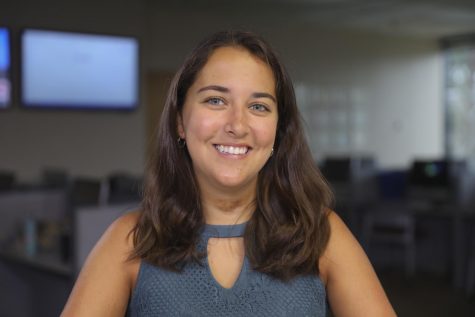Newman, Calzada: Campus climate survey needs 30 percent participation
October 30, 2017
Loyola’s administration began discussing a Campus Climate Assessment about a year and a half ago, after students delivered a list of demands to the president’s office regarding diversity, gender and disability oppression, according to Maria Calzada and Liv Newman, co-chairwomen of the survey.
The 30 minute survey includes questions regarding all parts of Loyola’s campus environment. The questions were chosen by the 17 member committee of faculty, staff and students from a list of survey questions provided by Rankin and Associates, the consulting firm chosen to conduct the survey.
Calzada and Newman said it was important to conduct the assessment externally for a variety of reasons.
“The institution wanted an outside firm because doing this work internally is oftentimes a challenge,” Newman said. “You need someone who is familiar with not only the background of many of the topics of importance but also someone who knows how to create a survey, how to run focus groups and how to do statistical analysis.”
The institution also wanted to remain objective when assessing itself, Newman and Calzada said.
Rankin and Associates has decades of experience in administering over 200 assessments for universities and university systems.
“In higher education, Rankin and Associates is the foremost group that conducts these type of assessments,” Newman said.
One section of the survey presents questions regarding sexual harassment and assault. Calzada and Newman said the possibly triggering questions were meant to inform how the university can improve its handling of such incidents.
Before the survey begins, there is a warning saying “there are no anticipated risks in participating in this assessment beyond those experienced in everyday life. Some of the questions are personal and might cause discomfort. In the event that any questions asked are disturbing, you may skip any questions or stop responding to the survey at any time.”
Beneath the questions discussing sexual assault, links to University Counseling, the Women’s Resource Center, and Mission and Ministry are provided.
Newman and Calzada stressed that anonymity was guaranteed, and any names or specifics of incidents would be removed from the data by Rankin and Associates before it was presented back to Loyola.
In order for the data to be a representative sample, 30 percent participation is required, although Newman and Calzada say their goal is 100 percent.
The survey runs until Nov. 3, and the data will be presented in spring 2018. Newman and Calzada said after they receive the data, the committee will hold a town hall meeting to develop actions and enhance and address issues that arise form the findings.







